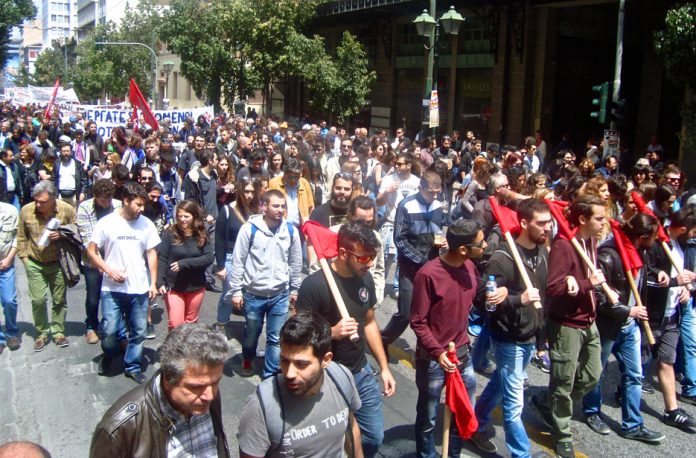WORKERS in Greece staged a militant two-day general strike last Friday and Saturday against the government’s Pensions and Tax Reforms Bill that crushes the state pensions system, cuts wages yet again and imposes huge tax hikes including a 24% VAT on basic goods.
The vote on the Bill was due for late Sunday night. On Sunday the GSEE (Greek TUC) called a national strike in commemoration of May Day and in support of the shop workers who have been fighting against Sunday working. Seafarers are staging a four-day national strike until Tuesday.
Fifteen uniformed officials, mainly police officers belonging to the Hellenic Federation of the Police (POASY) and unionists from the Greek Coast Guard and Fire Brigade, gathered at the Syriza central offices in central Athens. Holding banners, they occupied the building to protest against pension reforms, ahead of the parliamentary debate on Saturday and Sunday.
Friday and Saturday’s strike was total on transport: no buses, no metro, no trains, no trams appeared in Athens. Very high participation in the strike in telecommunications, while banks were shut throughout the Athens city centre.
But department stores and banks were opened in the capital’s suburbs and in the regions. 100% participation in the strike was recorded in ports and construction sites. Very high participation in the strike by local government workers, civil servants, hospital and post office workers.
The strike was solid in the press and media; no newspapers appeared and TV and radio programmes were restricted to two daily 15 minutes news broadcasts. But the GSEE (Greek TUC) and the ADEDY (Public sector workers’ federation) did not organise a single march or rally throughout the two-day strike and failed to mobilise the heavy industry workers and large factories.
Over 20,000 workers, unemployed and youth took part in rallies and marches held in Athens last Friday and Saturday organised by the Greek Communist Party (KKE) and trade union branches. Demonstrations were held in all major Greek cities.
